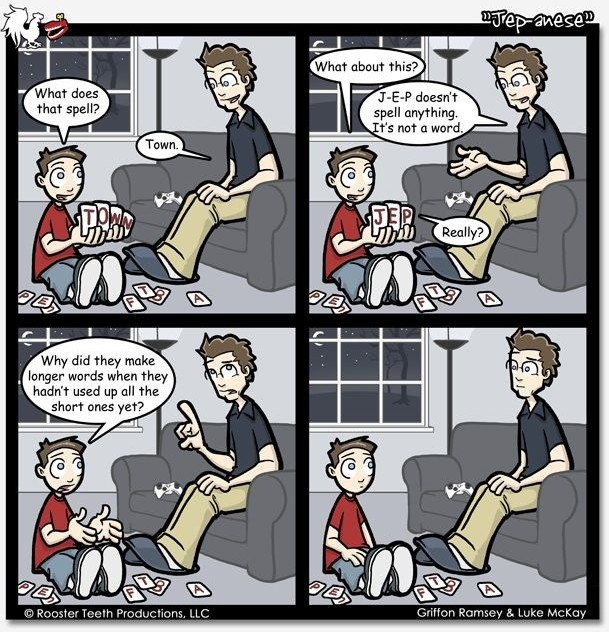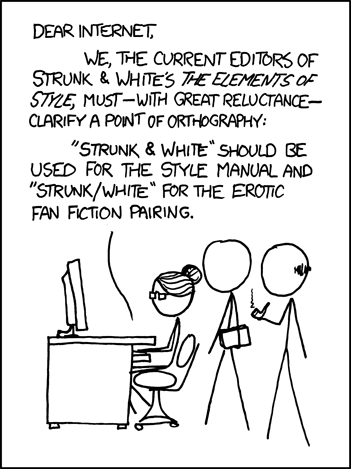Archive for July, 2011
Advantage Dilbert: Amber vulnerable to implicature
Dilbert continues to make progress in learning about conversational implicature and what you can do with it:
Read the rest of this entry »
Permalink Comments off
Genre
On Friday I visited Le Laboratoire de Phonétique et Phonologie at the Sorbonne Nouvelle in Paris, and among other things, I learned that there will be opportunities for marketing the iPeeve™ in France as well. In particular, for the past few decades, French speakers have been using genre ("sort, kind, type") as an approximative discourse particle similar to English like. An example from the web:
… apres moultes problemes pour se lever on est parti genre 4 heures en retard sur le pouce.
"after many problems getting up, we got underway like 4 hours late"
Read the rest of this entry »
Mr. Gravy
According to Martin Snapp, "At 75, it's been a long, strange trip for Berkeley's Wavy Gravy", San Jose Mercury News 5/6/2011:
In 1965, when he and his wife, Jahanara (then called Bonnie Jean), were living in a one-room cabin outside Los Angeles with about 40 friends, including fellow ice cream flavor and Grateful Dead guitarist Jerry Garcia, they all posed for a Life magazine cover photo.
Read the rest of this entry »
Rare causative spotted
"Switching strength on and off", Nature 6/9/2011:
A material has been designed to switch back and forth between a strong, brittle state and a weak, ductile one.
Hai-Jun Jin at the Chinese Academy of Sciences in Shenyang and Jörg Weissmüller at the Technical University of Hamburg in Germany made their composite by imbibing nanoporous gold (pictured) with an electrolyte. When the applied electrical potential shifted, the material showed distinct and reversible changes in strength, flow stress and ductility.
Read the rest of this entry »
Translationese
Looking at Geoff's post on machine-translated phishing scam messages, the message certainly does come across as very similar to the English output we in the biz frequently see coming out of statistical machine translation of Chinese. This includes Chinese-specific issues like recovering correct determiners from a language that does not express them overtly (I hope that the [not this] letter meets you in good spirits), as well as the ubiquitous phenomenon of sentences that are locally coherent — thanks to phrase-level translations and good statistical language-models for English — but globally nonsensical. I don't claim to know what makes a text poetic, but it seems to me that this combination of local coherence and larger-scale disconnectedness must be at least partly responsible for what Geoff describes as the "strange poetry" of machine translationese.
Read the rest of this entry »
The barley is their goal
You know what I think is happening? This is just too insane not to be true. I believe Hong Kong script kiddies wanting to try Nigerian-style thieving of bank account details are actually using Google Translate to translate their phishing messages from Chinese into English. Below the fold I quote in full (obscuring my address with x's to outwit the spam robots) a wildly, asyntactically unintelligible phishing spam which I received today. It's unintendedly hilarious — you could try reading it aloud at parties. And it's so garbled and implausible that I can't believe even poor naive Aunt Mildred will be suckered. Interestingly, it shows clear signs of being the output of very bad corpus-based translation, unsupervised and unchecked. My suspicion of Chinese provenance was based not just on the .hk (Hong Kong) address, but also on the fact that the spammer thinks an English-speaking PhD named Dr. Roller Key would refer to himself as Dr. Roller — that is, the Chinese syntax for personal names is being assumed.
Read the rest of this entry »
Permalink Comments off
As it turns out, that's not recommended
According to Adrien Chen, "Working at the Apple Store: Tales from the Inside", Gawker 6/16/2011:
Apple employees are banned from saying "unfortunately" when delivering bad news to a customer, urged instead to replace it with the more positive "as it turns out." And management apparently takes the ban seriously: One former Apple employee tells us that his coworker was put under a 90-day probationary period because he said "unfortunately" too much at the Genius Bar.
Read the rest of this entry »
X là là
I'm in France for a few days, at a workshop at ENSTA on Traitement de l'information multimédia. I'm staying with friends who have an energetic and enterprising two-year-old son, and so I've had the opportunity to do a bit of language acquisition. One of the commoner bits of child-directed speech, at least in this particular household, is a familiar French exclamation that I'll write as "X là là!", where "X" stands for a range of vowel qualities from IPA [ɑ] through [o] to [u].
All the versions of this exclamation share the factor of surprise, or at least the idea that something is out of the ordinary and worthy of note. But there's another dimension: is the noteworthy thing good or bad? And as far as I can tell, the higher and rounder the initial vowel, the more problematic the event or object under discussion.
Read the rest of this entry »
Justice Breyer, Professor Austin, and the Meaning of 'Any'
[Tap tap. Is this thing on?
I guess as a freshly minted Language Logger, I should introduce myself: I am a professor of linguistics at MIT. I work on meaning: semantics, pragmatics, philosophy of language, and the intersections thereof. I am also a part-time denizen of the academic Dark Side, as Associate Dean of MIT's School of Humanities, Arts, and Social Sciences. I blog on academic, geeky, abstruse, and personal aspects of my life on my personal blog "semantics etc.". Together with fellow LanguageLogger David Beaver, I co-edit the new kid on the block journal Semantics and Pragmatics, for which we maintain an editors' blog as well. So what's one more gig, right?
In this post, I partially recycle some notes that appeared on my blog in 2005. But there is a new angle.]
Read the rest of this entry »
Things that aren't what they are
I'm used to arguments that this or that word is actually "not a word". But I was surprised to see an analogous complaint about numbers that are allegedly not numbers, in Nadia Damouni, "Google bid 'pi' for Nortel patents and lost", Reuters 7/1/2011:
At the auction for Nortel Networks' wireless patents this week, Google's bids were mystifying, such as $1,902,160,540 and $2,614,972,128.
Math whizzes might recognize these numbers as Brun's constant and Meissel-Mertens constant, but it puzzled many of the people involved in the auction, according to three people with direct knowledge of the situation on Friday.
"Google was bidding with numbers that were not even numbers," one of the sources said.
Read the rest of this entry »
Pinyin for disambiguation
David Moser sent me this photograph of a sign on the side of a Beijing bus:
Read the rest of this entry »



